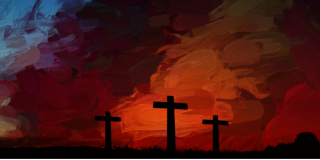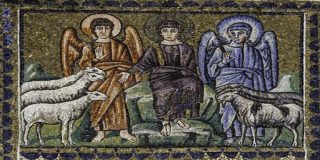In my last blog post I shared some of my difficulties with the doctrine of penal substitution. In this post I sketch how I articulate the biblical story of Jesus’s life, death and resurrection. In this I am heavily indebted to Tom Wright, The Day the Revolution Began and Darrin Belousek Atonement, Justice and Peace.
The story begins with the creation of the world….
Genesis 1 sees the cosmos as the temple of God (John Walton), a place inhabited by its Creator. Reflecting the unrivalled power of God, the earth takes shape in response to the Creator’s command; reflecting the creativity and imagination of its Creator, the earth is filled with living creatures of all kinds; reflecting the kindness, generosity and grace of its Creator the earth is a place of abundant provision for its creatures.
Humankind has a particularly important place. Of all the creatures we alone are the image of the Creator. Although this has been subject to a wide variety of interpretations, the most convincing is that humankind is created to represent God (Middleton, The Imago Dei). To be fully human is to be loving, just, generous, kind, faithful, compassionate and cultivate communities that share these qualities. We also have a unique calling to rule the animals and subdue the earth. Our subduing of creation is to reflect God’s subduing of creation, which occurs on days 1-3 of the creation narrative when God forms the earth into an environment in which the living creatures of days 4-6 are able to flourish. Likewise our rule is to reflect God’s, which is to ensure provision is made for all living creatures.
Yet the story of hope becomes a narrative of tragedy. Genesis 2-11 shows humankind spreading across the planet not as those imaging God and promoting the flourishing of all creatures, but as those who greedily compete for control of the earth’s resources and of each other, filled with hubris and violence. We become increasingly alienated from God, from each other, from the earth, and from what it means to be human. God exiles Adam and Eve from the Garden, Cain from his land, and eventually humankind from the earth. Yet even after starting over with Noah and Noah’s family, the descent into debased and abusive behaviour sets in once more.
God however is determined to restore blessing to all the creatures of the earth. Abraham is called to be the father of a nation through whom God will restore blessing (Genesis 12:1-3). Abraham’s descendants are the people of Israel, whom God rescues from brutal oppression as slaves to the Egyptians. Brought to God’s land, they are to be the human community imagined in the creation story, which will see them enjoy the blessing of God, which in turn will lead the nations to return to Yawheh (Exodus 19:4-6).
Israel fails in this vocation. The people chase after false gods and their life is typically marked by idolatry, inequity, violence, greed, oppression of the vulnerable. In Israel’s story the pattern of Genesis 2-11 is repeated over and over again. God sends prophets to confront Israel and call the people back to their vocation, but the message falls on deaf ears and the pattern of exile is repeated.
The prophets warn of this fate, but remind the people that God will always be faithful to the covenant between them, even if they do not reciprocate. A time is coming when their sins will be forgiven, their hearts will turn to God and they will be the vehicle to restore blessing to the earth.
That time arrives in the form of Jesus, who perfectly reflects the heart and character of God and perfectly reflects what it means to be human. He fulfils the calling of Israel to faithfully exhibit the love, grace, kindness, compassion, and justice of God, and will become the vehicle of restoring Israelites and the nations to God as they witness the possibilities of life under the reign of God.
His followers expect his ministry to issue in a triumphant visit to Jerusalem where he will set up a new government from which the empire of God will stretch across the earth. Jesus knows it will be different, that just as the people mocked, abused, opposed and even murdered prophets who preceded him, that they will do the same to him. He knows that his call for the formation of communities and lives grounded in faith, love, compassion, generosity, equity, etc will fall on deaf ears; that the rich will not bear to let go of their greed; the proud will not bear to let go of their pride; the anxious to trust God. We watch with despair as the elites of Israel conspire with the Roman state to physically and emotionally destroy him, and goad the masses into a bloodlust. Even his own disciples abandon him.
Yet through it all Jesus remains true to his vocation. He does not waver from the calling to image God, to be loving, compassionate, generous, kind, and graceful even as he writhes in agony on the ancient world’s most awful instrument of torture. “Father, forgive them for they don’t know what they do.” Even in the midst of his abandonment he maintains faith, taking for himself the prayer of the Psalm writer – “My God, my God, why have you forsaken me?”
On that bloodied, rough hewn cross the lone figure in all of human history who had been fully and completely human died. There the only Israelite who ever fulfilled Israel’s calling to be fully and completely given over to imaging God was murdered. And there on that awful instrument of torture faith, hope and love were broken, Christ’s lifeless body witness to our worst nightmare – the triumph of greed, hubris, violence and evil.
Two days later the nightmare ended. God raised Jesus from the dead! Love, compassion, generosity, grace and kindness had triumphed. The final word of history would not be death but life. In the risen Christ the nations could finally see the possibilities of life under the reign of God, that the final word in their lives need not be death but life; that the way to life and peace was through grace, love, generosity, servanthood.
Jesus commissioned his followers to take this message to the ends of the earth. That God is not against humanity, but for us. That the time of forgiveness, the pouring out of the Spirit, the resurrection of the dead and the renewal of creation has begun. That life under the reign of God is life indeed and will issue in life eternal.
On this reading:
• Jesus’s life, death and resurrection are read against the background of the Old Testament story.
• It is not God who has to be changed but us. God remains as always committed to our good, ready to forgive, and ready to contain evil through acts of judgement. It is we who have turned away from God and need to be turned back.
• Jesus’s death does not constitute God turning against Christ and punishing him, but humanity and the shadowy forces of spiritual evil turning against God and pouring their evil out on him;
• Jesus’s death shows us the extraordinary grace and love of God, whose response to the evil expended upon him is to offer forgiveness and reconciliation;
• Jesus’s death is “for us/for our sins”, in that the very purpose of living out the vocation of Israel was that people would turn away from idolatry, greed, etc and turn back to God. It was “because of our sin” in that it was human wickedness that crucified Christ.
• Jesus’ death becomes the place we experience God’s great mercy. In Romans 3:23 for example, Paul says God presented Jesus as hilasterion. Some translations give this as “propitiation”, which refers to a sacrifice that turns away God’s wrath; and others as “expiation”, which refers to sin being wiped away. The term is used in the Old Testament for the lid of the ark of the covenant, which was designated as the place God meets with the people, and was ritually cleansed (atoned for) through sprinkling with blood on the annual Day of Atonement. I think Paul it likely Paul is saying that Jesus is God’s meeting place with us, made possible by the wiping away of our sins through forgiveness.
Finally, the fact that different theories of the mechanics of salvation have long existed in the Christian church should not blind us to the reality that each is seeking to point us to the incredibly gracious, overwhelmingly generous, and exceedingly glorious work of God to rescue humankind and creation from captivity to greed, pride, idolatry and other forms of turning away from God in order that we might be restored being everything we were created to be.








Thanks Scott, I needed to read that.
Thanks Brian
Now that is good news!
Thanks Karl
Thanks, Scott. I appreciate the way that you have located the story of Jesus in the wider context of the whole,sweep of the biblical narrative. That certainly helps to provide a clear explanation as to why, and how, the cross plays a central role in the story, seen through the lease of Christian faith.
However, I think that you fall too easily into the classic Christian trap, of reading the OT as the “background”, setting the scene, rather than the “context” within which the story of Jesus takes place. For faithful Jews, like Jesus and his earliest band of followers, the stories and laws and psalms and prayers of the OT were their scripture, giving life to their faith, active and inspiring for them in daily life.
The trap is clearest when we compare your short summary of the OT with your summation of the mission of Jesus. You write, “The people of Israel … are to be the human community imagined in the creation story … [yet] Israel fails in this vocation. The people chase after false gods and their life is typically marked by idolatry, inequity, violence, greed, oppression of the vulnerable.”
By contrast, you note that Jesus “fulfils the calling of Israel to faithfully exhibit the love, grace, kindness, compassion, and justice of God” and on the cross “the only Israelite who ever fulfilled Israel’s calling to be fully and completely given over to imaging God was murdered.”
It is a classic Christian misstep, to portray the whole of the OT in negative terms, as a history of failure, and thus as the set-up for the sending of Jesus to rectify this sad saga of disobedience.
Yet the OT contains many, many examples of people of faith, dedicated to the covenant, committed to the way of God, fervent in prayer, devoted in service, compassionate in their seeking of justice, intent upon really being the people of God that they were called to be. Your reading of the OT provides no room for these stories, as you follow the classic line of viewing all of the OT as a massive failure.
Jesus himself is portrayed as one more in the line of the prophets, and before his birth, circumcision and dedication, Luke indicates that there were, indeed, faithful people of the covenant … so our own NT opens the door to a different assessment of the OT stories.
I think that this offers a different angle to the story you provide; it probably even strengthens some of your final claims. But in fairness to the people of the covenant, faithful Jews right throughout history, even up into our own time, we need to offer a different assessment of the foundational stories and ongoing narrative of the Jewish people, amongst whom Jesus was able to live out the story which you present.
Hi John,
Thanks for your comment. I think your point is fair. Indeed before I posted this I was conscious of the fact that it portrays the story of both Israel and humankind in terms of failure. In one sense I am comfortable with that, because I do think that we have failed to be the people we are created to be. Yet on the other, my thumbnail sketch can easily leave the impression that failure is the only thing that is true about us, which is way too one-dimensional. And as you rightly allude to, a nasty veneer of anti-Semtiism has been part of the church’s history and is something I certainly want rot avoid.
So yes my narrative could be substantially improved by recognising not only the way in which Jesus succeeds where we fail but where Jesus vocation affirms the many and varied ways in which we fulfil our vocation.I will give some more thought go how I can work this into my thumbnail sketch .
Do you think that Jesus is God? Asking as you don’t mention it, but rather say he images or reflects God, which isn’t the same as him actually being God.
Hi Kate, I haven’t said anything that would suggest I deny Jesus is God incarnate
Another great post, and quite a reasonable view of the sweep of history when your sole source is the Bible (but rather parochial otherwise!). But there are big things hinted at that you have not pondered on or speculated about. For instance after his resurrection he said “All authority has been given to Me in heaven and on earth” (Mt28:18), suggesting strongly that it was not so beforehand. So in spite of being the creator “by whom and for whom all things had been created” (Col1:16, Jn1:3) – and thus “God” by any reasonable definition of the word – yet he was not granted sovereignty over them in his own right until after completion of his earthy bestowal.
Another thing which you have summarised well but I feel you have not sufficiently emphasised is the *unchanged* content of the message that Jesus commissioned his followers to take to the ends of the earth. Very shortly *before* he dies (and before they even guess that he will die) Jesus says “… this_gospel_of_the_kingdom will be preached in all the world…” before “the end” (of the age) comes (Mt24:14) – indicating that no significant change was to be made to the gospel they had been trained to teach just because he was leaving the team. Then after Jesus’ resurrection he gives his so-called “great commission” (Mt28:19), in which all he really tells them to do is simply continue doing what they have been trained to do all along – ie “preach the gospel to all the nations”.
From the fact that right until the last moment, absolutely none of the evangelists expected Jesus to die (much less rise from the dead), clearly this event was not an essential part of their message. Also remembering Jesus’ reaction to Peter’s confession (that Jesus was the Messiah and the Son of God) in which he “strictly warned and commanded them not to tell anyone” (Mt16:20, Mk8:30, Lk9:21), these ideas also could not have been an essential part of their message. We can also be sure from the number of times he forbade people to talk about his miracles, that they also formed no part of the message. It is also important to remember that by this time the number of evangelists had swelled to approximately 100 (a dozen or so of John disciples, and then the 70+ second generation of Lk10:1). Jesus considered that his death and resurrection was not even important enough that the 90 odd evangelists that were still out preaching should come to Jerusalem to witness it!
Don’t you find it hard to believe that neither Jesus’ messiahship, or his divinity, or his miracles, or his death, or resurrection formed any *essential* part of his gospel! I don’t think I have met a Christian yet who can fully accept these obvious facts. But your summary of Jesus message has pretty much managed to leave them all out. So congratulations – I think your understanding must be far more correct than most!
Thank you, Scott. As always, your writing is eloquent and deep.